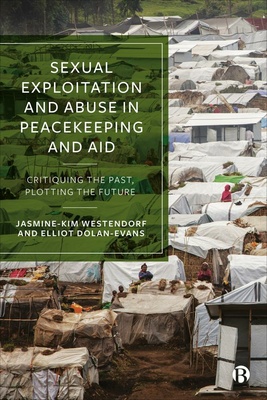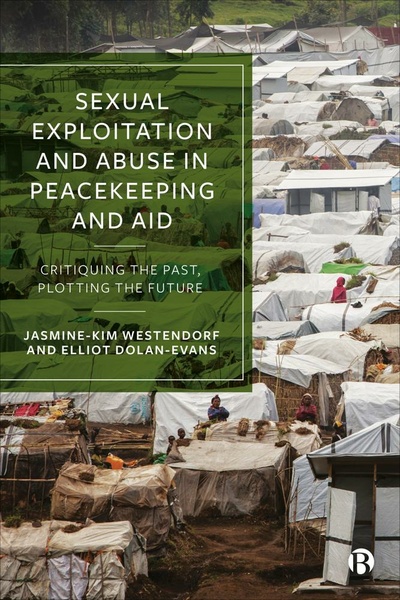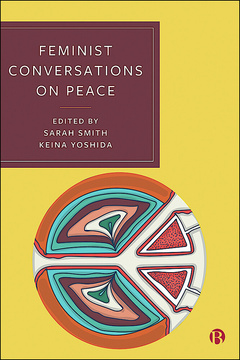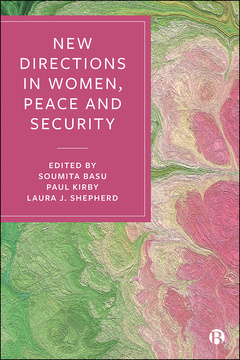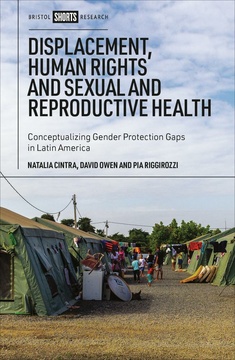Sexual Exploitation and Abuse in Peacekeeping and Aid
Critiquing the Past, Plotting the Future
Edited by Jasmine-Kim Westendorf and Elliot Dolan-Evans
Published
Jul 29, 2024Page count
272 pagesISBN
978-1529238419Dimensions
234 x 156 mmImprint
Bristol University PressPublished
Jul 29, 2024Page count
272 pagesISBN
978-1529238402Dimensions
234 x 156 mmImprint
Bristol University PressPublished
Jul 29, 2024Page count
272 pagesISBN
978-1529238426Dimensions
234 x 156 mmImprint
Bristol University PressIn 2003, the UN adopted a zero-tolerance policy on sexual exploitation and abuse by peacekeepers and aid workers. The policy arrived amid a series of scandals revealing sexual misconduct perpetrated against the very people peacekeeping and humanitarian missions were meant to protect.
This edited collection, including contributions from academics and practitioners, highlights the challenges of preventing and responding to abuse in peacekeeping and aid work, and the unintended consequences of current approaches. It lays bare the structures of power, coloniality and racism that underpin abuse and hinder accountability while charting a path for future action.
This eye-opening book will appeal to academics and students of the politics and practice of peacekeeping and humanitarianism, and to practitioners, policy makers and those working within the field.
“An impressive group of grittily knowledgeable contributors reveal the hard feminist lessons learned over the last 30 years of transforming UN and humanitarian organizations: lessons about stubbornly patriarchal institutional cultures, about implementation failures when gender inequity persists at the operational ground level and, crucially, why justice for women and girls in crisis zones is the sine qua non for sustainable peace.” Cynthia Enloe, Clark University
“This collection is essential reading for those of us working on questions of gender, power and violence in humanitarian and peacekeeping contexts. The volume challenges conventional boundaries and forges connections between scholars and practitioners.” Lucy Hall, University of Amsterdam
Jasmine-Kim Westendorf is Associate Professor of International Relations at La Trobe University. She has written two books and numerous articles in top journals. She has extensive experience in conflict resolution and prevention of sexual exploitation and abuse, and has held visiting professorships at several institutions.
Elliot Dolan-Evans teaches at Monash University. He holds a PhD in International Relations with a focus on the political economy of peacebuilding, capitalism and health, and the activities of international financial institutions during war. His work has appeared in several international journals, and he has professional experience in law and medicine.
Introduction
Critiquing the Past and Plotting the Future - Jasmine-Kim Westendorf and Elliot Dolan-Evans
Part I: Where We’ve Been: The Origins and Scope of PSEA
1. Reflections on 20+ years of PSEA Work - Sarah Martin
2. UN Police as a Double-edged Sword for SEA Accountability - Ai Kihara-Hunt
3. Victims’ Rights and Remedial Action - Sabrina White and Leah Nyambeki
4. Sexual Violence Against Peacekeepers and Aid Workers - Phoebe Donnelly and Dyan Mazurana
Part II: How It’s Going: Implementing and Institutionalizing PSEA
5. Missing the Mark in PSEA - Asmita Naik and Jasmine-Kim Westendorf
6. The Imperative of Prioritizing Victims’ Rights - Jane Connors
6a. United Nations Victims’ Rights Statement
7. Accountability Advocates: Representing Victims - Sabrina White
8. Masculinities and Institutional Blind Spots - Jasmine-Kim Westendorf
9. Power, Consent and Peacekeeping Economies - Kathleen Jennings
10. Gender, Race, Sexuality and PSEA - Junru Bian, Megan Daigle, Sarah Martin, and Henri Myrtinnen
11. “We Don’t Have a Word for That”: Issues in Translating PSEA Communication - Emily Elderfeld and Ellie Kemp
12. From ‘Cultural Sensitivity’ to ‘Structural Sensitivity’ - Nour Abu-Assab
Part III: Looking Forward: Where to from Here?
13. Agency and Affect in PSEA - Nof Nasser-Eddin
14. Empowered Aid - Alina Potts
15. Rethinking PSEA: Reflections for Policymakers - Jasmine-Kim Westendorf







